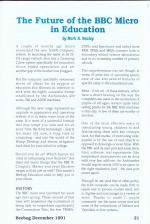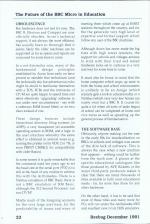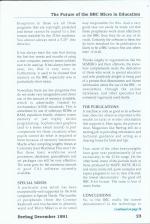
Beebug
 1st December 1991
1st December 1991
Author: Mark Sealey
Published in Beebug Volume 10 Number 7
The Future Of The BBC Micro In Education
A couple of months ago Acorn announced the new A5000 computer system. In launching the latest in its 32-bit range (which also has a Learning Curve option specifically for education) Acorn ended speculation and yet another gap in the market was plugged.
But the company justifiably renowned above all others for its support of education also showed its intention to stick with the highly successful format established by the Archimedes 400 series, 540 and A3000 machines.
Although the new range represents an upgrade in appearance and operating system, it is in many ways more of the same. It is more of a successful formula that may tempt you once and for all away from the 8-bit technology - nearly ten years old now, a long time in computing - and into the world of the Wimp, Desktop and almost obligatory hard discs for your school or college.
Should you do so? Which factors are valid in influencing your decision? Are there not many things that the BBC B, Compact, Master and even Electron ranges will do just as well? This month's Beebug Education aims to help you in your choice.
History
The BBC micro was launched ten years ago next spring. Those around at that time will remember the excitement of being able to outperform significantly the Commodore Pets, the few TRS80s, ZX81s and Spectrums and rather more RML 380Zs and 480Zs common both in secondary school science laboratories and in an increasing number of primary schools.
This outperformance was not, though, in terms of price but of operating speed, ease of use and several features of specific value to the educational user.
Most - if not all - of these features, which have a direct bearing on the way the computers are used in the curriculum of pupils of all ages, remain quite valid selling points for the BBC 8-bit machines to this day. A few of them are worthy of mention.
One of the most effective ways of introducing young children to and familiarising them with key concepts (and, for that matter, of motivating older pupils) is by the use of real objects as opposed to drawings or even films. With the BBC and its user port and some fairly basic software, real experiments (like temperature measurement) can be done with very few add-ons. An Archimedes would require nearly £100 to be spent on the right expansion card - the user port scores again.
Through its use (and that of other ports), the 8-bit computer can be made both to speak and to process sounds itself, and to digitise and scan images in a variety of ways. Thanks to mode 7, pupils commonly use the same screen font and some of the conventions of Teletext and Viewdata on-line systems.
Obsolescence
But hardware does not last for ever. The BBC B, Electron and Compact are now officially obsolete. Acorn's technical support, if not always the most efficient, has usually been so thorough that it seems likely the older machines can be supported as far as spares and repairs are concerned for some time to come.
In a not dissimilar vein, many of the fundamental design principles established by Acorn from early on have proved so sensible that technicians (and the technically shy but adventurous) who might be afraid to familiarise themselves with a TOS, FCBs and the intricacies of CP/M are quite happy to spend time and effort effectively 'upgrading' software to run under new circumstances - say with a sideways RAM board fitted, or on two discs instead of one.
These design features include hierarchical directory filing systems (in ADFS), a very transparent yet accessible operating system in ROM, and a logic in the user interface whereby the same effect is obtained in several ways (e.g. turning the printer on by VDU 2 or B, or even PRINT CHR$(2) for compatibility with older Basics).
In some senses it is quite remarkable that the command used ten years ago to set the baud rate at the serial port (*FX7,n) is still at the heart of any routine to achieve this with the Archimedes. There is a Nimbus emulation of BBC Basic; there is not a BBC emulation of RM Basic, although the 512 Second Processor can run CP/M!
Maybe much of the foregoing accounts for the very large user base, for the predictability of issues and ways of meeting them which come up at INSET sessions throughout the country, and for the the generally very high level of expertise and formal support which follow any user of the BBC machines.
Although Acorn has never made the big time with high street retailers, the support for schools and colleges anxious to stick with their tried and tested hardware looks set to continue in a very real way for some time to come.
It must also be borne in mind that the home computer which crops up most in both the home and school environments is unlikely to be an Amiga (which scarcely gets a look-in educationally) or a Nimbus (which very very few homes can surely own) but a BBC B. It counts for quite a lot when all sorts of tasks begun at school can be completed at home and vice versa as well as speeding up the general process of familiarisation.
The Software Base
Obviously, anyone making out the case in the early 80s for standardisation on BBCs in schools and colleges was aware of the dire lack of software. This is always the case when a new machine first appears - nothing could be further from the truth now. A glance at the specific educational catalogues like those produced by AVP, Ricketts or the major third-party producers makes it clear that there are many thousands of titles available to fulfil most educational needs - far, far more than those for any other hardware.
On the other hand, it has to be said that most of these titles and many more for PCs will run under the Archimedes 6502 and excellent new (v1.6) DOS emulators. Exceptions to these are all those programs that are copyright protected and hence cannot be copied to a disc format readable by the 32-bit machines. You almost always need a 5.25" disc drive too.
It has always been the case that during the first few weeks and months of using a new computer, memory seems unlikely ever to be used up. It has always been the case, too, that it very soon is. Furthermore, it used to be claimed that memory on the BBC especially was in particularly short ration.
Nowadays there are few programs that do not make very imaginative and clever use of the amount of memory available, which is admittedly limited by Archimedes/A3000 standards. This is sometimes by use of sideways ROMs or RAM, expansion boards, shadow screen memory or just highly skilful programming. Sophisticated graphics (and to a lesser extent sound) in part compensate for those occasions when pupils cannot do what is required of them because of memory limitations.
Maybe when compiling lengthy theses at University level Wordwise Plus won't do. But those basic workhorse word processors, databases, spreadsheets and art packages can still be very effective. The same goes for the enormous amount of good CAL software currently available.
Special Needs
A particular area which has been exceptionally well supported by the 8-bit computers is Special Needs. The number of peripherals (from the Concept Keyboard and touchscreen to photonic wand and Micro Mike) is in no small way responsible for this. And a very good case can easily be made out that these peripherals work more effectively on the BBC than they do on any of its rivals. Certainly the software is there; the de facto standard for its publication is likely to be a BBC version first and others later - if at all.
Thanks largely to organizations like the SEMERCs and their offshoots, the know-how complements nicely the dedication of those who work in special education and who positively delight in being part of a process that disseminates and shares information about the use of the BBC - in newsletters, through the on-line databases, and other specialist but extremely vigorously used media.
The Publications
A machine is only as good as its software base, then; but almost as important is the wealth (or lack) of written information that supports it. Here again, the picture is clear. Magazines like Beebug still do a sterling job in providing information and technical guidance and acting as a clearing house for hints and tips.
True, most of the other heavyweights have gone over predominantly (if not exclusively) to the 32-bit range. On the other hand, many of the journals (such as those produced by MAPE, MUSE, BLUG and many more) still quote examples and expect programs to run in, dare it be said, the lowest denominator - the good old BBC 8-bit format. The same is true of many books.
Conclusions
So, is the BBC really the lowest denominator? Is the technology so outworn that we should abandon it today? Certainly, the path towards the A3000 or A5000 is an attractive one.
Certainly the true desktops (however good their 8-bit imitators) are a superior and more intuitive interface. True, the range of appealing software packages now available for the 32-bit range compares in many ways more favourably with what was available for the BBC four years after it first appeared. Multimedia applications like Magpie and Genesis, DTP applications like Impression and Ovation, and the multi-tasking nature of the Desktop, which allows pupils simply to drag or click on files for the relevant application to start, are a real boon to busy teachers and pupils anxious just to get on with it.
The reason for this advance, though, must be that the very programmers who have created marvels like Pendown and Multistore were practised BBC experts before changing up. The 8-bit range served them well.
If it is sheer processing power you want, undoubtedly an ARM 3 with RiscOS 3, 4 Mbytes of RAM and a low-cost hard disc can scarcely be bettered anywhere. Nor will the 8-bit scene last for ever. If, on the other hand, it's the support, familiarity, vast range of serviceable software, reliable peripherals and add-ons, experts (or someone willing to have a go) round every corner and all the collective wisdom accrued over ten years, which only a classic attracts, then there's a lot of life in the old dog yet; witness the fact that Beebug sells all the trade-in BBCs it can get.
This article was converted to a web page from the following pages of Beebug Volume 10 Number 7.





